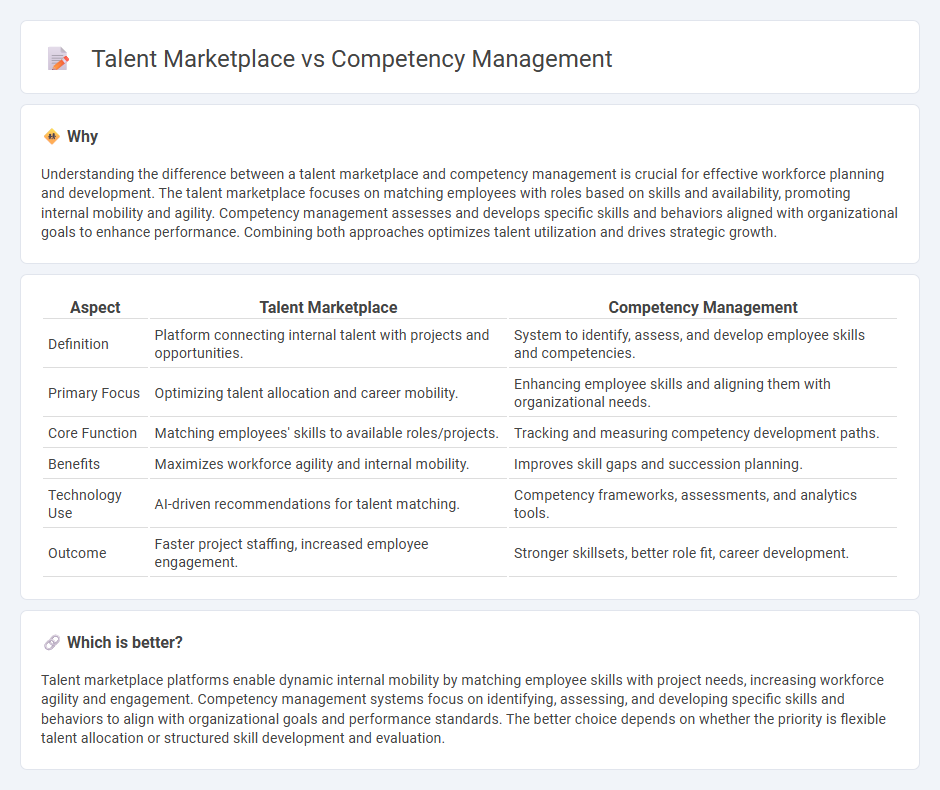
Talent marketplace platforms enable organizations to match employees with projects based on skills and interests, enhancing workforce agility and engagement. Competency management systems focus on identifying, assessing, and developing employee skills to meet organizational goals and drive performance. Explore how integrating these approaches can revolutionize your talent strategy and boost productivity.
Why it is important
Understanding the difference between a talent marketplace and competency management is crucial for effective workforce planning and development. The talent marketplace focuses on matching employees with roles based on skills and availability, promoting internal mobility and agility. Competency management assesses and develops specific skills and behaviors aligned with organizational goals to enhance performance. Combining both approaches optimizes talent utilization and drives strategic growth.
Comparison Table
| Aspect | Talent Marketplace | Competency Management |
|---|---|---|
| Definition | Platform connecting internal talent with projects and opportunities. | System to identify, assess, and develop employee skills and competencies. |
| Primary Focus | Optimizing talent allocation and career mobility. | Enhancing employee skills and aligning them with organizational needs. |
| Core Function | Matching employees' skills to available roles/projects. | Tracking and measuring competency development paths. |
| Benefits | Maximizes workforce agility and internal mobility. | Improves skill gaps and succession planning. |
| Technology Use | AI-driven recommendations for talent matching. | Competency frameworks, assessments, and analytics tools. |
| Outcome | Faster project staffing, increased employee engagement. | Stronger skillsets, better role fit, career development. |
Which is better?
Talent marketplace platforms enable dynamic internal mobility by matching employee skills with project needs, increasing workforce agility and engagement. Competency management systems focus on identifying, assessing, and developing specific skills and behaviors to align with organizational goals and performance standards. The better choice depends on whether the priority is flexible talent allocation or structured skill development and evaluation.
Connection
Talent marketplaces leverage competency management by mapping employees' skills and qualifications to real-time project needs, promoting optimal resource allocation. Competency management systems continuously assess and update individual capabilities, enabling talent marketplaces to match talent with appropriate opportunities efficiently. This connection enhances workforce agility and ensures strategic alignment between employee skills and organizational goals.
Key Terms
**Competency Management:**
Competency management systematically identifies, assesses, and develops employees' skills and behaviors essential for organizational success, ensuring alignment with strategic goals. It leverages detailed competency frameworks to guide training, performance evaluation, and succession planning across roles. Discover how competency management drives workforce effectiveness and nurtures continuous employee growth.
Skill Assessment
Competency management emphasizes structured frameworks to evaluate employee skills against predefined criteria, ensuring alignment with organizational standards and growth pathways. Talent marketplaces leverage dynamic skill assessments to match employees with project opportunities based on real-time capabilities and learning progress. Explore how integrating advanced skill assessment techniques can optimize workforce potential in both systems.
Competency Framework
Competency management centers on defining, assessing, and developing specific skills and behaviors within a competency framework to align employee capabilities with organizational goals. Talent marketplaces leverage these frameworks by matching internal talent to suitable projects and roles, promoting agile workforce mobility. Explore how integrating competency management with talent marketplaces can enhance talent utilization and career growth.
Source and External Links
What is Competency Management? Best Practices In 2025 - AIHR - Competency management is a multi-step process involving identifying, developing, assessing, and optimizing employees' skills, abilities, and behaviors aligned with organizational goals, involving key stakeholders and a systematic approach to essential and job-specific competencies.
Competency Management: Definition & Best Practices - Personio - Competency management is the process of identifying key skills required for employees to meet business goals, assessing current workforce skills, and creating development plans to bridge skill gaps.
Competency Management - Oracle Help Center - Competency management categorizes and tracks employee qualifications needed to perform jobs, enabling clearer job descriptions and searchable databases to find employees with required skills.
 dowidth.com
dowidth.com